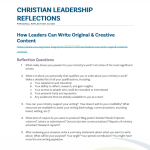Many leaders write for their ministries and want to create original and creative content that readers will read to the end. How can you consistently produce content like that? Recently I read a great biography of A. W. Tozer, a prolific writer, and it included the following gems for the writers among us that will boost both our originality and creativity. If you are a writer or would like to be a writer, Tozer’s thoughts about writing offer great insights developed from years of writing.
While the following are great tips for writing, I was saddened as I read the book at the isolation of Tozer from his wife and family. His prodigious writing output came at the cost of his family having the husband and father God intended families to have. Be careful that your writing, or indeed ministry, comes at the cost of your family.
Tips for Writing Original Content
Tozer’s books and articles were so well received because they contained original thoughts based on his own thinking and reflection. The bullet points below are all quotes from the book The Life of A. W. Tozer: In Pursuit of God by James Snyder and will help you be more creative with your own writing. My comments are in the sub-bullets in italics:
- What set Tozer apart was his ability to quickly assimilate the knowledge he gained from reading. Tozer was more than a reader — he was a thinker. He often counseled, “You should think ten times more than you read.” This was his own practice throughout his life. By doing his own thinking, he arrived at this own independent conclusions.
- I heartily agree with this. Leaders — make time for thinking!
- “Get the idea clear,” he used to say, “and the words will take care of themselves during [sermon] delivery.”
- Amen! When I find myself spending hours trying to write a post, it’s almost always because either I haven’t thought clearly enough about what my point is or I haven’t got the logic right of how to present the point.
- “The only book that should ever be written is one that flows up from the heart, forced out by the inward pressure,” he often cautioned aspiring writers. “You should never write a book unless you just have to.”
- Yes! I never write unless I have something I think will be a unique contribution to the literature or I am reporting something I think my audience will find helpful. No copycat writing from me!
- Tozer labored over everything he wrote. “Hard writing makes for easy reading,” he often said. He worked and struggled until each sentence was exactly the way he wanted it. He read aloud every line to check for repetition or imprecision. His style was lean, precise…”
- I’ve been told many times that I’m a good writer. My response is always, “I’m actually a mediocre writer, but I’m an excellent editor!” Once you’ve thought the topic through, I find getting the idea down in words is relatively easy. Getting it so people will want to finish reading it is quite another!
- In his writing Tozer left the superficial, the obvious, and the trivial for others to pursue. He was disinterested in the passing parade of fads and trends, concentrating on those principles affecting a person’s relationship with God through Jesus Christ. Only by the discipline of study and prayer could he say something of lasting relevance on that level. The timelessness of Tozer’s writing is evidence of his success.
- There are so many books to read! If you have something original to write that will add a valuable perspective or be a completely new take on something, go ahead and write. I wrote a post about how I weed out the copycat books that may help you read just the ones that will advance your thinking.
- Tozer often wrote the first draft of a project by hand. He believed he could control the words better that way. Later he would type out a second draft. Usually his secretary typed the final draft. She sometimes served as a sounding board for his output.
- One secretary in particular tried Tozer’s patience, but he did not have the heart to replace her. He gave her a handwritten copy of an article he wanted typed. When she was finished, Tozer went to retrieve it. “What did you think of that article?” he asked inquisitively. “Oh Dr. Tozer,” the woman apologized, “I didn’t read it — I just typed it.” Tozer sadly shook his head and walked away.
- I have to send kudos to Bonnie Pillsworth, my executive assistant, who since 2014 has been not only a great editor of my posts (beyond my own editing), but has also been an outstanding sounding board to help me improve the content.
- When urged by some to resign from Southside Alliance and give full-time attention to the editorship [of the denominational magazine], Tozer was adamant. “I can’t give up the pastorate,” he explained to a friend. “I need that discipline of preaching to the same congregation week after week. Without it, I would go stale. And if I don’t preach, I have no material. When I prepare for the pulpit, then I can write editorials and articles.”
- I agree. My leadership role at CCCC keeps me current in the practice of leadership. It keeps me grounded in the practical, never leaving a topic as just a theoretical idea. Not only does my current leadership experience give me the motivation to research and write about certain topics, but what I write always feeds back into my leadership. There is a great benefit to leaders who write even if they don’t publish their writing.
- Tozer complained, “I must be going soft in the head. I haven’t had one original thought all week.”
- A week without an original thought is when I know I need to book some reading and reflection time!

Where to Get Ideas for Writing
You might be feeling like I did when it was suggested that I write a blog: “What do I know that is worth writing about and that people will want to read?” I thought I could write three or four pasts max, but here we are 15 years and more than 355 posts later! Once you start writing, the ideas will flow. I’ve had some lengthy breaks from writing as leadership matters filled my time, but I have lots of ideas for what comes next. I’m sure once you start, the ideas will flow for you as well.
For my situation, creating knowledge content about operating a Christian ministry is what my ministry does, so my blog about organizational leadership fits. For you, you’ll likely want to write about your ministry and its cause or mission, possibly as an advocate for public policy or to educate the public, or you might write for your supporters.
I mentioned above that one source for ideas of what to write about is my own leadership experience. I get my ideas for the blog topics from four main sources:
- Hearing leaders talk about what’s on their minds.
- Things I’m thinking about regarding my own leadership.
- Connecting CCCC’s mission and values to leadership.
- “Aha!” thoughts that come to me as I read.
Blessings!



